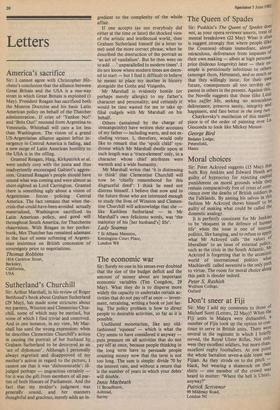Moral choices
Sir: Peter Ackroyd suggests (15 May) that both Roy Jenkins and Edward Heath are guilty of hyprocrisy for rejecting capital punishment on moral grounds while they remain comparatively free of crises of cons- cience over the deaths of British soldiers in the Falklands. By aiming his salvos in this fashion Mr Ackroyd shows himself to be guilty of making what could be called the domestic analogy. It is perfectly consistent for Mr Jenkins to be 'eloquent in the defence of human life' when the issue is one of internal politics, like hanging, and to refuse to acIPIY what Mr Ackroyd calls 'the values. of liberalism' to an issue of external polIcY, such as the crisis in the South Atlantic. Iv!I. Ackroyd is forgetting that in the atornistic world of international politics what Machiavelli called necessity is the only path to virtue. The room for moral choice along this path is slender indeed.
Peter S. Rashish
Wolfson College, Oxford






































 Previous page
Previous page